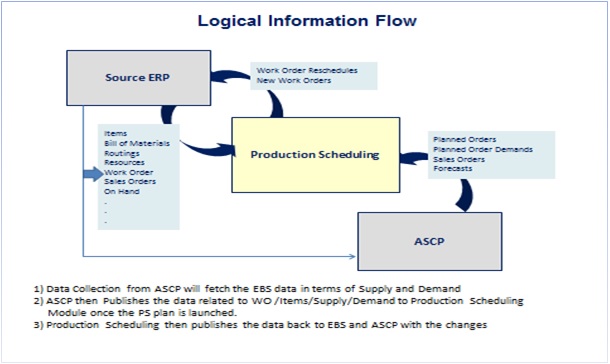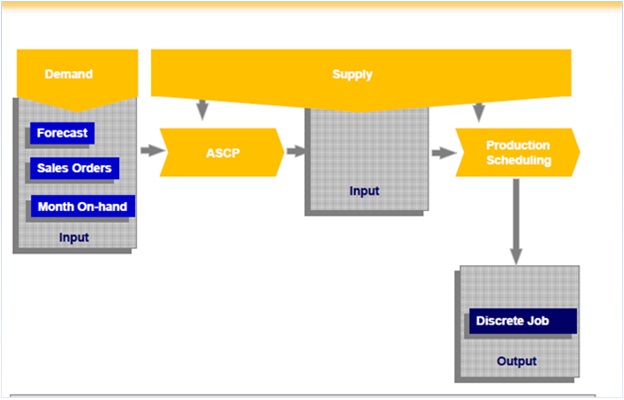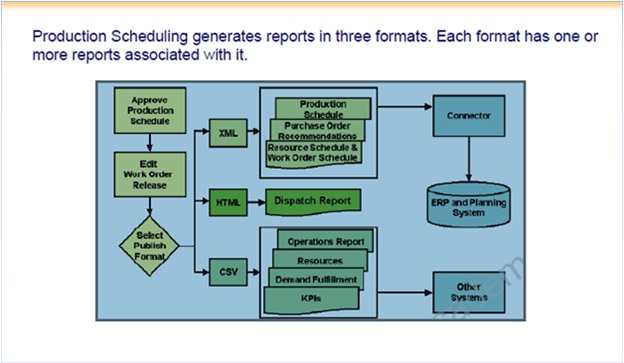Case Study on Oracle Production Scheduling Issues for Batches Integrated from Process Manufacturing
Issues with scheduling of batches in Oracle Production Scheduling tool efficiently and correctly due to the Inability to update the underlying steps and processes within the Batches in Oracle Process Manufacturing that are in process, that are integrated from Process Manufacturing to Production Scheduling is not an issue anymore with the implementation of this integrated solution as described in this case article
Logical Information Flow:
The below figure shows the logical data flow in the system from EBS to ASCP (Advanced Planning tool) to Production Scheduling tool.

Problem Evolution:
- During the investigation of Oracle Production Scheduling’s (PS) inability to launch the plan to support a molecule, errors were identified per Oracle PS Exception Report. Users attempted to correct errors based on the Oracle PS Exception Report on the impacted work order but were unable to add Step Dependency or Step/Material Association based on security configuration under Production Planner responsibility within Oracle EBS suite
- Due to the nuances and complexities of process manufacturing meaning where a step or operations can be added or removed at last moment and it goes the same for the ingredients that are used in the batch, unplanned situations will arise where an operation must be repeated (i.e., utility equipment failure, processing errors, testing failures). This will require that for the new operation added, associated ingredients must be added to the work order in Oracle to transact to the appropriate step. The business requirement for in-process operations is that the work order is in WIP where an attribute like Step Dependency cannot be added. If the Step Dependency is not added to the work order, Oracle PS will fail to launch the plan.
Situation description:
The business requirement for in-process operations is that the work order is in WIP where an attribute like Step Dependency cannot be added. If the Step Dependency is not added to the work order, Oracle PS will fail to launch the plan.
In the case of the Step/Material Association attribute, it cannot be modified if the field is not populated. If this field is not populated, it will result in an exception when the Oracle PS Exception report is generated. This will lead to the failure to solve the plan in Oracle PS.
Issue with Production Schedule Workbench due to the above issue:
- PS workbench is failing to open when launching and opening PS plan with data that is currently in the system.
- Main reason for PS throwing an error when opening workbench is auto generation of routings by PS. Cases when PS will auto generate routings
- Hanging operation steps: Operation steps that are not dependent on any other operation. To further clarify the operations within the batch that are not interconnected those are termed as ones with hanging operations steps.
- Hanging formula ingredients: Ingredients that are not associated to any operation step in routing. To further clarify its the ingredients that are used in the batch or Work Order to yield in the operation usage towards the assembly. So, these ingredients need to be connected to an operation to yield something to the next steps within the batch. When these are not connected to an operation step then those are termed as hanging formula ingredients.
The Oracle PS Exception Report will provide results of exceptions for attributes that must be set correctly in the master data and work order to allow the application to launch. Due to the limitation in the security configuration of the Production Planner responsibility, exceptions cannot be addressed on the work order when the status is in WIP.
With the Oracle PS application considered as the source of truth for Production Detailed Scheduling, the ability to launch the plan at any time is vital to reduce the heightened risk of a delay to the manufacturing schedule.
PRODUCTION SCHEDULING Behaviour:
- When we have mix of hanging and non-hanging operation steps as explained above, where the operations are the steps that are required to perform a manufacturing operation. If these operations are not related in sequence or connected with one another PS will create new routing by itself and create dependencies for operation steps that are left independent.
- Similarly, when we have mix of ingredients like some are assigned to operation steps and some not PS will assign all the left-out ingredients to very first operation step and it will create new routing.
- In both the above cases PS is able to handle these scenarios sometimes and generate schedule using these new routings.
- But as complexity increases when PS tries to schedule using auto generated routings it goes into circular dependency error leading to failure to complete the plan.
Why did it take so long to figure this out?
- Mainly because of inconsistency in the issue. PS is sometimes able to handle hanging operations and hanging ingredients and sometimes not. For the same recipe it worked sometimes and failed in other instances.
- Oracle support recommends making sure no hanging operations, no negative numbers, no same operation names but never specified about step material association.
- Even for recipes where there are no hanging operations PS used to fail many times and this gave us an impression of hanging operations is not an issue and something to do with Production Scheduling system
Impact of the Issue:
Overview of Plan in Supply Chain:
Plan in supply chain can be defined as attributes such as constrained, unconstrained, or optimized plan class based on business objectives such as maximizing inventory turns, on time delivery, and plan profit that generate the supply and demand recommendations accordingly to allow further planning for the supply chain planner.
Production Scheduling of Batches in Upstream and Downstream warehouses are scheduled based on the batch Production Schedule generated from within the Oracle PS system. The ability to launch the plan at any time is vital to reduce the heightened risk of a delay to the manufacturing schedule. If the supply chain plan cannot be launched due to any reason the schedule changes and accuracy is affected bringing the whole activity of batch steps to be manually scheduled and overseen. This will not only put the other Master batch records on hold which are not on priority but also put significant chances for scheduling errors for the batches with high volume.
Production schedule tool in itself has significant cost within its setup and procurement itself apart from the challenges that it brings within itself. This being a niche tool and with features that it embeds to help scheduling function with ease based on such high volume and number of batches scheduled for Upstream and downstream warehouses it becomes critical and important for the business to have this tool function effectively and shows the correct data intended from the Oracle ERP system to further process and schedule for manufacturing operations and personnel.
The solution for the business case was thought off from the Product standpoint if there was anything that can be provided as a solution within the product itself by changing the configurations. Once the analysis proved that the existing product does not offer the solution and there will be need for gap fit analysis required. This paved us path for re-engineer the process on some of the technical components and below were the two options to be considered:
Solution Explained:
- Customization that will be performed at the Oracle ERP side which will be on the Batch form that would enable the option to have the field enabled for user to put step dependencies and step material association manually. This would solve the issue of connecting the material with the step and also performing the step dependencies for the operations to flow. This option provided the ability to key in the information, the concern that was open due to batch being in WIP there will be other data dependencies that might get impacted due to this. As the product was tailored and designed that way, we wanted to make sure that even though the plug-in was brought in, it did not cause any data discrepancies elsewhere. We wanted to give this option the last resort
- Plug-in within the Production Scheduling tool, once the data is fed from Oracle ERP system into the tool and before the Production Scheduling plan was launched. This xml file of the work Order extract will be scanned for such issues and step dependencies along with step material association will be attached to correct and with relevant details before the plan is launched. This option provides seamless integration and data integrity to be intact as the source is not modified and only the destination so as the plan launches successfully to further enable to schedule the batches for Production.
After weighing both the options the final decision was made by the Business Process owners of the system, supply chain team from business and Information Technology project team to correct the master data setup for the recipe and formula to keep the Master batch record for the batch correct. And for further changes in batches due to the complexity of the site and business needs which was brought up as a business case, the approach was decided through a plug in within the Production scheduling tool.
This supply chain issue within the organization and the solution provided to keep the business functioning came to me as an ideal case for my research article. This issue was of relevant importance to the business as part of sustainment efforts for the Production scheduling tool with the budget and other constraints in focus.
Alternatives:
Security Configuration Change to the Production Planner responsibility. Available Workarounds and Compliance Issue with each:
- As a system workaround if a work order is in WIP, a user with the Production Planner responsibility was able to move the batch to Pending status to add the Step Dependency and/or Step/Material Association.
- Changing the status of a work order in WIP to Pending will un-release the work order which will revert all transactions that were made. This was an unacceptable workaround as it presents compliance issues with data integrity and traceability with the Lot Genealogy Report.
- As a system workaround, a user with the Production Planner responsibility can also complete the step so Oracle PS does not consider it further in its planning
If a user with the Production Planner responsibility completes a step on the work order, it presents a compliance issue with data integrity and traceability against the Master Batch Record (MBR). The misalignment of dates can present unnecessary questions during lot disposition.
If a Production Planner has the access to insert ingredients and/or steps to a work order, they should be allowed to add Step Dependency and Step/Material Association knowing that these are required fields to support Oracle PS sustainment. Adding these functions presents no risk whereas following the workarounds introduces compliance risks.
Demand And Supply Feed from Planning to Production Scheduling System Illustrated:
The below figure explains the Demand and supply feeds into the Advanced Supply chain planning tool, and which is then fed as input to the Production Schedule tool to schedule the batches and publish it to the EBS suite application

Publish Process within Production Scheduling:
The below figure explains the technical process within the Production Scheduling tool. This is just additional information from within the tool. Information on how downstream technical components work within the tool.

Result:
The research of the problem and the solutions finally brought the results that business was looking finally to be able to schedule the batches within the PS tool. The users were able to perform master batch record changes in the last moment by adding new steps or operations or adding new ingredients to the batch and still have the data integrated to Production scheduling for making any latest schedule changes on the same batch or another without encountering an issue that would happen otherwise before this change was implemented.
 Written by - Sumesh Menon
Written by - Sumesh Menon

